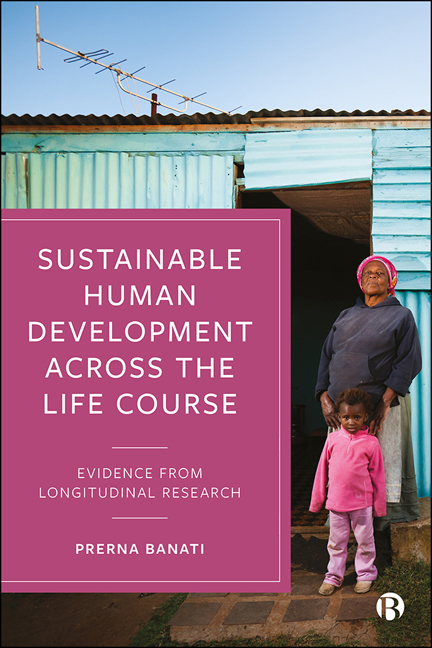Book contents
- Frontmatter
- Dedication
- Dedication
- Contents
- List of Figures, Tables and Boxes
- Notes on Contributors
- Foreword: Understanding and Enhancing Human Development Among Global Youth – On the Unique Value of Developmentally Oriented Longitudinal Research
- Introduction: Measuring Sustainable Human Development Across the Life Course
- 1 Exploring the Potential for Gender Norm Change in Adolescent Girls: Evidence from ‘Real Choices, Real Lives’ Longitudinal, Qualitative Study Data
- 2 Unequal Educational Trajectories: The Case of Ethiopia
- 3 Early Life Transitions Increase the Risk for HIV Infection: Using Latent Class Growth Models to Assess the Effect of Key Life Events on HIV Incidence Among Adolescent Girls in Rural South Africa
- 4 Achieving the Sustainable Development Goals: Evidence from the Longitudinal Parenting Across Cultures Project
- 5 Achieving Gender Equality: Understanding Gender Equality and Health Among Vulnerable Adolescents in the Sustainable Development Goals Era
- 6 Capturing the Complexities of Adolescent Transitions Through a Mixed Methods Longitudinal Research Design
- 7 Child Well-being Across the Life Course: What Do We Know, What Should We Know?
- 8 Mauritian Joint Child Health Project: A Multigenerational Family Study Emerging from a Prospective Birth Cohort Study: Initial Alcohol-related Outcomes in the Offspring Generation
- Conclusion: The Future of Longitudinal Research
- Index
7 - Child Well-being Across the Life Course: What Do We Know, What Should We Know?
Published online by Cambridge University Press: 05 January 2022
- Frontmatter
- Dedication
- Dedication
- Contents
- List of Figures, Tables and Boxes
- Notes on Contributors
- Foreword: Understanding and Enhancing Human Development Among Global Youth – On the Unique Value of Developmentally Oriented Longitudinal Research
- Introduction: Measuring Sustainable Human Development Across the Life Course
- 1 Exploring the Potential for Gender Norm Change in Adolescent Girls: Evidence from ‘Real Choices, Real Lives’ Longitudinal, Qualitative Study Data
- 2 Unequal Educational Trajectories: The Case of Ethiopia
- 3 Early Life Transitions Increase the Risk for HIV Infection: Using Latent Class Growth Models to Assess the Effect of Key Life Events on HIV Incidence Among Adolescent Girls in Rural South Africa
- 4 Achieving the Sustainable Development Goals: Evidence from the Longitudinal Parenting Across Cultures Project
- 5 Achieving Gender Equality: Understanding Gender Equality and Health Among Vulnerable Adolescents in the Sustainable Development Goals Era
- 6 Capturing the Complexities of Adolescent Transitions Through a Mixed Methods Longitudinal Research Design
- 7 Child Well-being Across the Life Course: What Do We Know, What Should We Know?
- 8 Mauritian Joint Child Health Project: A Multigenerational Family Study Emerging from a Prospective Birth Cohort Study: Initial Alcohol-related Outcomes in the Offspring Generation
- Conclusion: The Future of Longitudinal Research
- Index
Summary
Introduction
The 2030 Agenda for Sustainable Development, which includes 17 global goals, charts an ambitious course for the coming decade and beyond. Attached to the goals are 169 targets, which lay out the specific aims towards which the global community is working. In total, 95 of the targets are either directly (48) or indirectly (47) connected to children. The SDGs can only deliver on the promise of equity if the world knows which children and families are thriving and which are being left behind (UNICEF, 2017). Understanding the situation of children in relation to the SDGs is, therefore, crucial both for the well-being of children and for reaching the targets of the global goals.
Childhood well-being has an impact on a range of outcomes such as adult health, educational attainment, and employment and socioeconomic status in adulthood (Statham and Chase, 2010). Even though there is general agreement that policies to ensure child wellbeing are necessary there are disparities in the practical implementation of policy between countries and on regional levels. In some countries, a lack of financial resources may be the main reason for not having an appropriate monitoring system that has the potential to inform politicians on a regular and reliable basis; on the other hand, it could be a question of competing priorities. There is, however, an acknowledged need for high-quality data on child and youth well-being, necessary to inform policy making aimed at addressing the 2030 Agenda for Sustainable Development Global Goals.
A longitudinal survey design has the unique capacity to capture the dynamics of childhood and young person development and helps to capture the impact of major life events, such as starting school, reaching adolescence and leaving home as well as giving a rare insight into the effects of socio-political changes and historical events that take place during their lifetime. This crucial phase of the life course is included in the focus of SDG 4 – Quality Education and SDG 8 – Quality Work (UN, 2020). Birth cohort surveys across the world have been central to our understanding of the factors which contribute to enhancing child well-being. These longitudinal data sets provide the highest quality data, which reveal demographic patterns of difference, changes over time and factors associated with high levels of well-being.
- Type
- Chapter
- Information
- Sustainable Human Development across the Life CourseEvidence from Longitudinal Research, pp. 165 - 192Publisher: Bristol University PressPrint publication year: 2021



